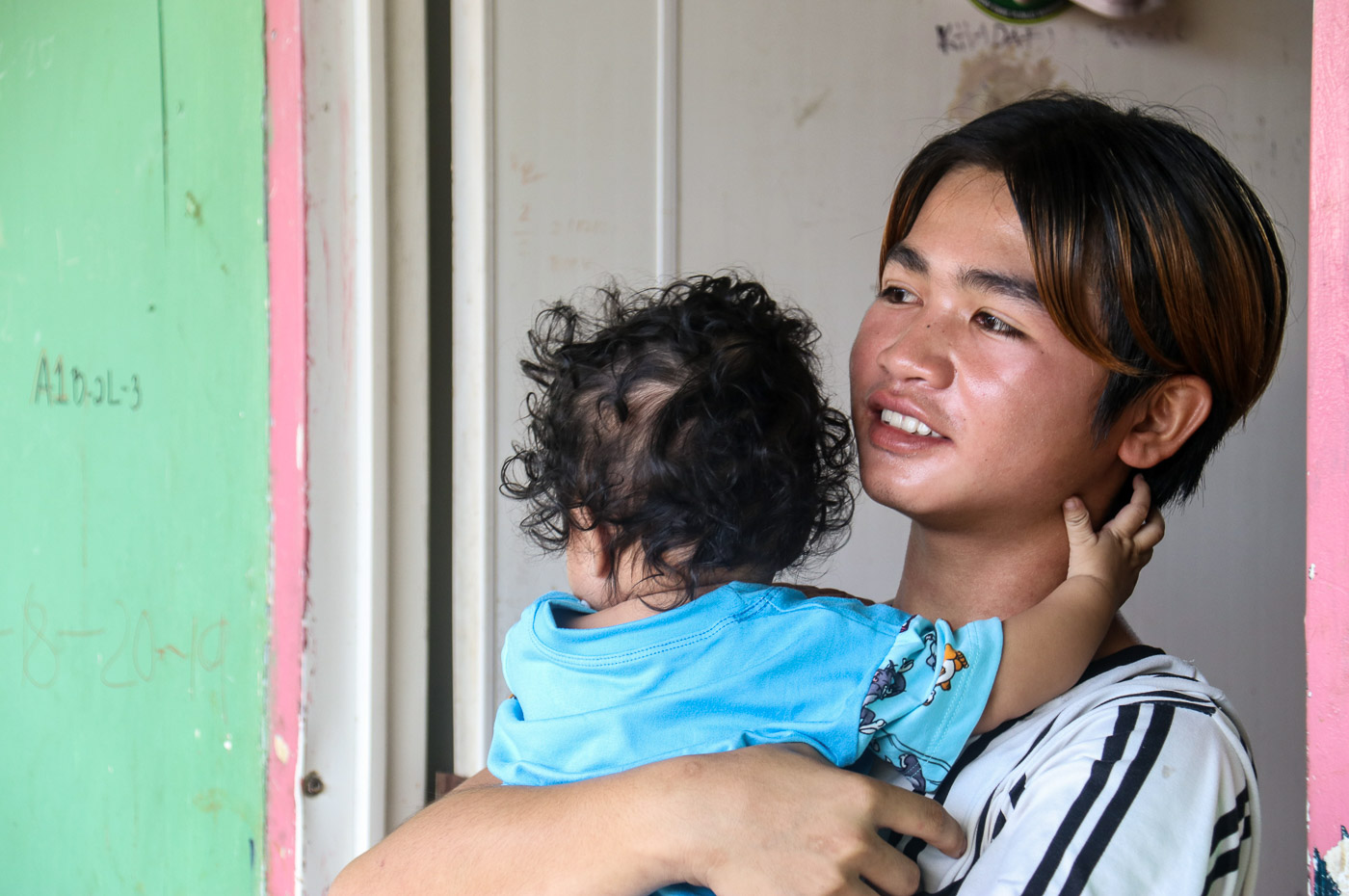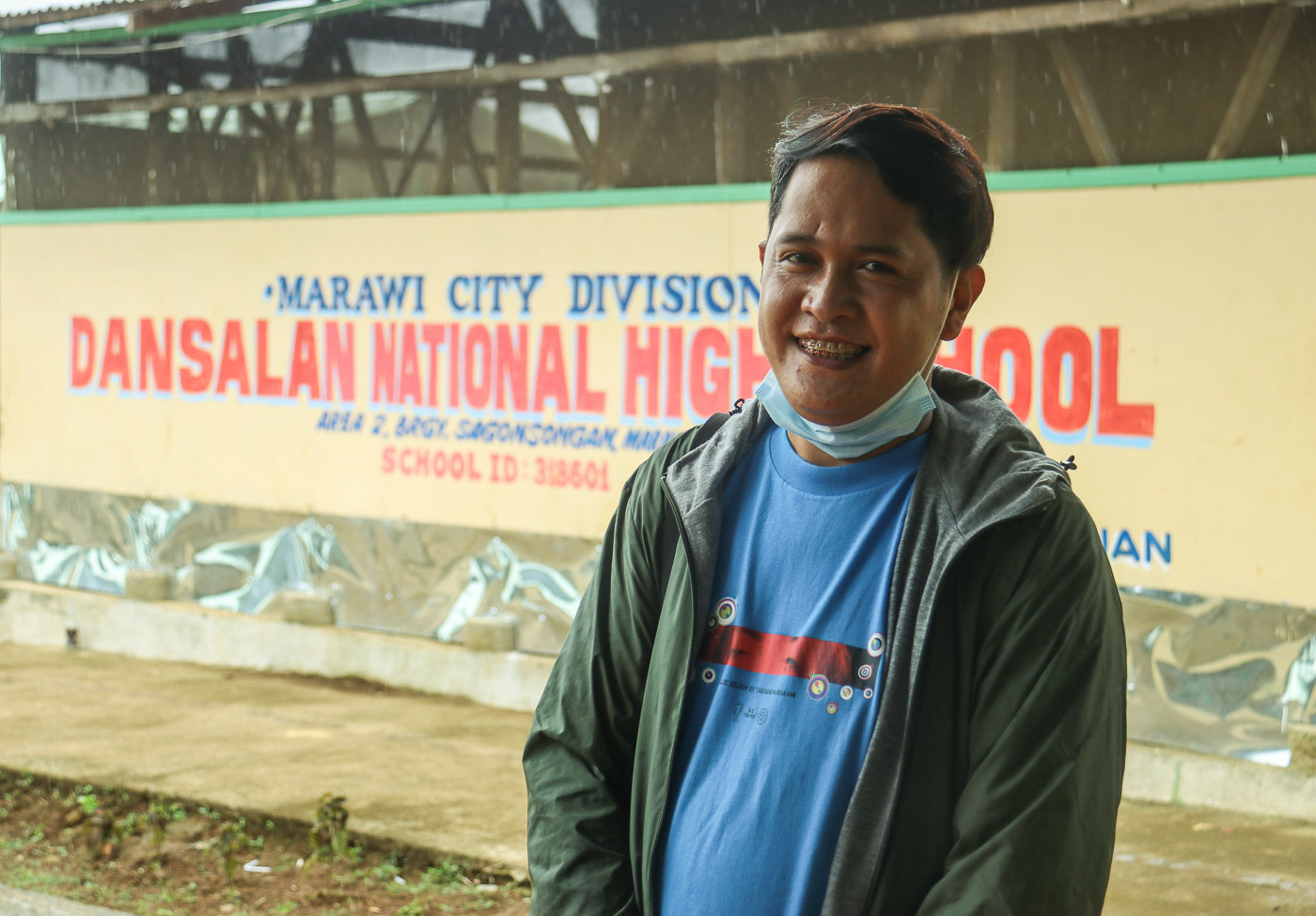
“Tuwing nasa lake ako, pakiramdam ko malaya ako kasi nakakasama ko yung mga kaibigan ko. Tatalon kami nang sabay sabay tapos mararamdaman namin yung malamig na hangin ng Marawi habang pababa sa tubig,” Asnifah Arimao said as she reminisced on the sweetest memories of her hometown.
(Whenever I’m at the lake, I feel free because I can be with my friends. We’d jump into the lake, feeling the cool breeze of Marawi as we dive into the water.)
When the war broke out on May 2017, Asnifah and her family thought that the incident will only last for three days, hence, they did not bring their valuables and many other things when they fled the City of Marawi.
Together with her 9 siblings and their parents, Asnifah ended up in Poona Bayabao as an internally displaced person.
“Naghirap kami doon kasi ang inaasahan lang namin ay relief goods at mga ipamimigay ng ibang tao na may magandang loob.”
(We had a hard time there, because all we could rely on were relief goods and what was offered by people with kind hearts.)
Since the conflict dragged on for 5 months – far longer than they expected –they, alongside thousands of evacuees, had to pull through. She, together with her siblings, continued their education while at the evacuation site. She was in the sixth grade when the siege broke out.
During her stay in Poona Bayabao, she still got to dip into the lake, but she no longer had her friends to share the moment with and, more importantly, she no longer felt free. At the time, she was eaten by shame.
“Kapag mag-aaral na kami, napakahirap. Naliligo kami sa tabing-dagat, nakikita ng mga classmates namin. Kaya pagdating sa classroom bigla kaming iju-judge.”
(When we tried to study, it was difficult. We’d bathe along the shore, and our classmates would see us. When we get to the classroom, they would judge us.)

In the case of Jalanie Khadafi, he had to rely on the two notebooks and a pen that their school principal provided in order to continue his studies. However, it wasn’t the lack of school supplies nor the loss of their home that struck him the most. It was the discrimination he felt that made him think twice about going to school.
“Hindi madali yung pag-aaral. Minsan nahihiya kami kaya hindi kami nakakapasok. Noong bakwit kami, madaming nang-aasar samin na bakwit kami. Kaya nawalan kami ng confidence at hindi na lang pumasok kasi nakakahiya at masakit yun sa amin.”
(Studying wasn’t easy. Sometimes, we’d feel embarassed so we wouldn’t go to school. When we were evacuees, there were those who’d make fun of us. We lost confidence in ourselves and didn’t go to school, and reality of it stings.
When they finally moved to their transitory shelter in Sagonsongan, both Jalanie and Asnifah enrolled in Dansalan National Highschool. Asnifah said the situation became a little more bearable in terms of education, since no one was picking on her – she finally found a sense of belongingness.
“Nagbago yun dahil lahat ng kasama ko dito ay kapareho namin na bakwit.” (Things changed because everyone with us here in school was also an evacuee.)
“Ang sarap sa pakiramdam kasi pare-pareho kayo na nakakapagshare ng napagdaanan during the siege.“ (It felt good to know we could share our experiences during the siege.)
A new obstacle
Just when Asnifah found comfort in her new circle, she was faced with another obstacle: the COVID-19 pandemic.
The outbreak of the pandemic forced the country’s education system to veer away from the traditional face-to-face classes. When this happened, Asnifah said one of her motivations to continue her education was challenged as well. She was forced to stop seeing her support system.
“Sumama yung loob ko nung nagkapandemic dahil hindi kami makalabas. Dahil sa pandemic na ito, lahat na lang hindi mo makikita.”
(I felt bad when the pandemic occurred because we couldn’t go out. Because of the pandemic, I couldn’t see anyone.)
Jalanie sometimes attends his classes while taking care of his younger brother. His father works as a freelancer inside ground zero while his mother makes cloth facemasks.
“Ang hirap kasi parang hindi ka makasabay kasi online class.” (It’s hard because it feels like I can’t follow along because it’s an online class.)
Some of their classmates have the means to buy cellular load to research online. As for Asnifah, she only counts on what is provided in the modules.
“Dati, naga-guide ako ng teacher kapag may hindi ako maintindihan, pero ngayon iba na.” (Before, my teacher could guide me if I couldn’t understand something, but things are different now.)

Both Asnifah and Jalanie are students of Teacher Hans Mambuay. Even Teacher Hans is aware that the current setup poses a risk on the quality of education that his students are receiving.
“We cannot expect the students to learn what they are supposed to learn. Even with face-to-face education, as bakwits, they already had a hard time comprehending the lessons. What more now, when they have no one to guide them?”
In the Bangsamoro, almost 900,000 children who were enrolled in learning in the last school year had to stop their education in March, said Andrew Morris, Chief of Field Office in Mindanao of UNICEF. For most of them, they have not been able to restart their learning to an acceptable level of quality and frequency.
BARMM’s Ministry on Basic Higher and Technical Education introduced and rolled out various learning modes – online and blended homebased approaches – however, neither of these have fully covered the educational needs of the children.
“This is extra difficult for students with parents who are unable to do the task of teaching their children – it is either they do not know how to read nor write themselves, or they are busy working so they can put food on the table,” said Teacher Hans.
Morris said that with no alternatives for online or effective homebased learning, the number of children dropping out might be the highest ever in the Bangsamoro region.
Poverty and instability drive the children to have a share of household or financial responsibilities. As a result, school dropout rate is high which poses a threat to finishing their studies.
Sacrificing for the dream
When asked how he navigates through his education despite the challenges faced, Jalanie answered, “Sacrifice po.”
Aside from having high grades in his academics, he is also an active participant of extracurricular activities.
“Dahil wala akong pambayad, hindi na lang ako sumasali sa ibang mga event.” (Because I had no money, I didn’t join some events. Teacher Hans, however, acknowledged how good a student Jalanie is.
“He was supposed to be awarded as the top student in their moving-up ceremony last year,” but due to the pandemic, no ceremony was held.
Asnifah feels like she will never be as happy again when they were displaced.
“Parang naramdaman namin na hindi na kami ulit makakauwi sa bahay namin na puno ng kasiyahan. Madaming masasayang memories doon sa dati naming tinitirhan,” Asnifah said.
(I feel as if we won’t be able to return to our house, where I was happy. There were many happy memories in our old place.)
Asnifah dreams of becoming an accountant, believing that it will be a tool to pull them out of poverty.
“Para matulungan ang parents ko kailangan ko magsacrifice.” (To help my parents, I need to sacrifice.)
But she is worried that a time will come when she will have to stop her education.
“Napag-usapan na namin ng magulang ko na pagdating ng kolehiyo, mahihirapan kami dahil walang budget,” she said. (My parents and I talked about it, and if it comes time for college, we’ll have trouble because there’s isn’t a budget for it.)
Jalanie, on the other hand, aspires to be a lawyer to “help those who are just like us that are in need.”
Although he acknowledges attaining the aspirations of his students will be a rough ride, Teacher Hans strongly believes his students will achieve their dreams.
According to Morris, putting together the shortfalls in learning and mental health protection means that, at the moment, most children in the Bangsamoro are missing out on opportunities toward their better future and will not develop their full potential.
“The families are missing out on opportunities to break the cycle of poverty by getting their children through a full basic education and opening up different work opportunities for them,” Morris added.
Both Jalanie and Asnifah’s dream of entering the University of the Philippines.
“Kung mangangarap ako ng school, sa UP ko gusto kasi napapanood ko lang yun sa TV. Ang sarap dun, parang doon ko matututunan kung paano magpatuloy mamuhay dahil magagaling ang mga tao doon,” said Asnifah.
(If I were to dream of a school to go to, I’d think the University of the Philippines would be it, as I only see it on TV. It looks nice there, and I think I would be able to learn how to continue living because the people there are great.)
Despite the challenges, they still hold on to her dream and cling on to their faith.
But for now, they are still braving through life’s uncertainty. – Rappler.com

Post a Comment